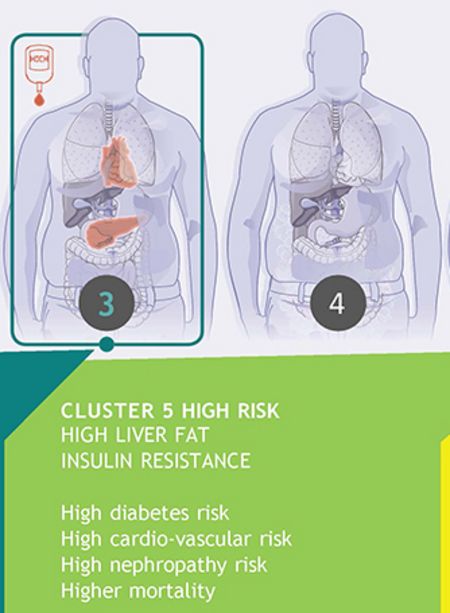Düsseldorf, 21.01.2022
Prediabetes More Dangerous Than Assumed
Prediabetes should not simply be understood as a "last warning" before the actual diagnosis of diabetes because already the preliminary stage of diabetes mellitus increases the risk of serious complications. This was brought to light by an umbrella review conducted by the German Diabetes Center. What exactly are the results?
It is generally well known in the population that diabetes can lead to serious complications. In contrast, comparatively little attention has been paid to prediabetes – many people are unfamiliar with the term. Prediabetes is a preliminary stage of type 2 diabetes in which the glucose metabolism is already disturbed but type 2 diabetes is not yet manifest. What at first hardly seems a cause for alarm and suggests that one is not yet affected by the disease, does in fact pose risks. In recent years, more and more studies have been published indicating that already prediabetes can be associated with chronic complications and comorbidities. The German Diabetes Center (DDZ), a partner of the German Center for Diabetes Research, has now analyzed and evaluated the existing studies and their significance in a comprehensive review.
"What we are referring to here is termed an umbrella review. Such reviews compile data from meta-analyses, which in turn bundle all individual studies on a specific topic. Here, the relationship between prediabetes and the risk of diabetes-related comorbidities was investigated," said Prof. Dr. Michael Roden, scientific director and executive board member of the DDZ. "The results show that prediabetes is associated with an increased risk of comorbidities such as cardiovascular disease, stroke, chronic kidney disease, dementia, as well as cancer and higher mortality rates in general. Prediabetes is thus more dangerous than assumed and requires increased attention not only by scientists but also in clinical practice."
The findings are also relevant because prediabetes is on the rise worldwide. The International Diabetes Federation (IDF) recently estimated the number of prediabetes cases for 2021 to be at least 10.6 percent of the world's adult population, or 541 million people. For 2045, it even predicted an increase to at least 11.4 percent, which in turn corresponds to 730 million people. In view of these prospects, prediabetes represents a strategic time window of opportunity in which the risk factors that can still be influenced – such as obesity (overweight), unhealthy nutrition and lack of exercise – can be specifically addressed in order to prevent or at least delay the development of type 2 diabetes and its complications.
"Comprehensive reviews such as this umbrella review help us to gain a broad overview of a topic area and to assess the robustness of the respective findings according to reproducible and transparent standards," said Dr. Sabrina Schlesinger, head of the research group “Systematic Reviews” at the DDZ, who led the study. The above results are considered to be moderately robust, which means that the findings are likely to reflect the true association. Prof. Dr. Christian Herder of the DDZ added, "Given the identified research gaps in this area, further studies on the links between prediabetes and various health outcomes are needed to more soundly estimate the potential clinical and cost benefits of intervention measures."
Original publication:
Schlesinger S, Neuenschwander M, Barbaresko J, Lang A, Maalmi H, Rathmann W, Roden M, Herder C. Prediabetes and risk of mortality, diabetes-related complications and comorbidities: umbrella review of meta-analyses of prospective studies. Diabetologia. 2022 Feb;65(2):275-285. doi: 10.1007/s00125-021-05592-3.

Excerpt of prediabetes subtypes (clusters) published by DZD
researchers. © IDM, DZD
Related news and image source of the above figure:
Prediabetes Subtypes Identified
The German Diabetes Center (DDZ) serves as the German reference center for diabetes. Its objective is to contribute to the improvement of prevention, early detection, diagnosis and treatment of diabetes mellitus. At the same time, the research center aims at improving the epidemiological data situation in Germany. The DDZ coordinates the multicenter German Diabetes Study and is a point of contact for all players in the health sector. In addition, it prepares scientific information on diabetes mellitus and makes it available to the public. The DDZ is part of the Leibniz Association (Wissenschaftsgemeinschaft Gottfried Wilhelm Leibniz, WGL) and is a partner of the German Center for Diabetes Research (DZD e.V.). www.ddz.de/en
Contact:
Gordon McBane
Pressesprecher DDZ
gordon.mcbane(at)ddz.de
+49 (0)211 3382-450
Press contact

Birgit Niesing
niesing(at)dzd-ev.de
+49 (0)89 3187-3971
